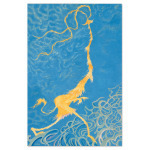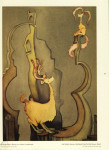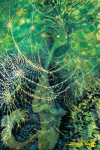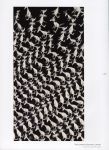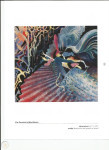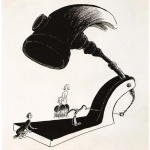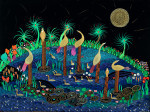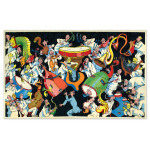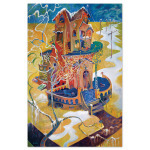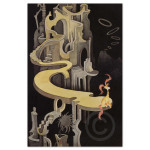Rick Wayne's Blog, page 22
April 29, 2020
(Art) The Rebel Demigods of Elena Bespalova
[image error]
The rash and beautiful demigods and heroes of Los Angeles-based game artist Elena Bespalova charge into their fate or fall to it tragically. Rebels all, her characters have more adventure than sense as they dive from rooftops or fall recklessly in love — just what we want in our stories and games.
Find more by the artist on her ArtStation page.
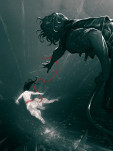





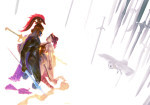



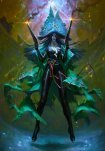



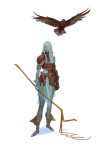
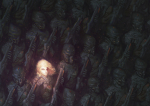
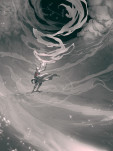
April 28, 2020
April 27, 2020
(Fiction) Rule of Salts
[image error]
The technician at her feet looked up. “Is that too tight?”
Nio examined the heavy bracelet around her left ankle: woven Kevlar attached to a hardened plastic box with a single recessed infrared lens.
“It’s fine.”
The tech ratcheted the specially-shaped sprockets one click tighter and stood up. “Done,” he told the officers behind him.
The man in charge was Special Agent Roger Erving, who had flown in from New York after several days of negotiations. His office handled high profile cases and had originally investigated Sol’s death. He was neatly suited with a violet tie that complemented his dark skin. He was an inch or two shorter than average, but his piercing eyes and confident grip more than compensated. He wore a wedding band and a ruby-tipped class ring to a school Nio didn’t recognize. He spoke in a rich baritone, like a sports announcer or radio DJ.
“I’m not sure what Dr. Chang told you,” he said as the tech stepped away, “but your purview will be limited to assisting the Bureau in its investigation into the disappearance of Albumin Sol Einstein. You are authorized to conduct no other business or activities while under remand, is that understood?”
Nio nodded.
“Under the US Constitution and the laws of South Dakota, you are not obliged to admit guilt, and this agreement doesn’t infringe that right. However, it is an ‘at-will’ arrangement. It can be terminated by either party at any time. If we’re not satisfied with your progress, or if you’re not satisfied with how you’re being treated, just say the word and you will be taken into custody and returned to the Brown County Sheriff at the first available opportunity. Do you understand all of that as I’ve explained it to you?”
“What about Mr. Misery?”
“Any alleged crimes peripheral to this case are not your concern.” He glanced down to her socks like he just noticed she had no shoes. “You should’ve reported him to us.”
“Check your records, chief.” Nio crossed her arms. “I tried.”
Erving’s mouth turned down slightly. He turned and raised a hand to second agent, an enormous man, both tall and broad-shouldered, with a dark complexion that didn’t seem to belong to any ethnicity in particular.
“This is Agent Arlo Quinn from the Bureau’s Minneapolis office.”
His expensive Italian silk tie didn’t match the rest of his stiff-fabric suit, nor did his suit match his longish hair. He looked more like a surfer than an FBI man, but his bioelectrics were strong. Nio could feel him modulating between standard and heightened arousal, a pattern she had noticed was common with athletes, soldiers, and performers—anyone in the habit of reacting quickly.
“Unfortunately, Agent Quinn drew the short straw and got the arson case. He’s going to be looking after you, reporting to me, for the duration.”
“A babysitter,” Nio said, sizing him up.
“What did you expect?”
Agent Quinn’s dark brown, wiry hair was well tousled. His narrow eyes were constantly smiling even when, as then, his mouth wasn’t. He was recently clean shaven, judging from the razor burn on his neck, and noticeably handsome—in a very conventional sort of way. His face was extraordinarily symmetrical. He looked to be in his 30s, which was plenty of time for an equally conventionally attractive woman to scoop him up, but there was no ring on his finger.
“Do you have any questions for me?” Special Agent Erving asked.
“When do we talk about my side of this bargain?”
“After you demonstrate your willingness to cooperate and produce results. I respect Dr. Chang’s position on this and understand where he’s coming from. But we’re the ones taking the risk here. You’ve been granted a tremendous opportunity. Make the most of it.”
“When do I get my personal effects?”
“That’s up to the sheriff. Anything else?”
Nio shook her head.
“Then my advice is to take the evening. Relax. Get used to being out of your cell. Agent Quinn will buy you dinner. Nothing too fancy,” he added as an aside. “You start first thing in the morning. Now, if you’ll excuse me, I have a plane to catch.”
With that, he nodded to Agent Quinn and walked out the front.
“You have some ID?” Nio asked the big man. He had arrived late and she hadn’t had a chance to ask before.
Quinn looked incredulous, but he complied. He reached into the breast pocket of his coat and removed his credentials.
Nio studied them. “Arlo Miguel Quinn.” She looked up. “Miguel?”
“After my grandfather,” he said flatly.
Standing next to him, Nio thought he seemed even bigger. He had to be at least six-foot-six. He struck Nio as someone who used to lead an active life but didn’t since joining the FBI and was paying the price on his waistline. If he’d been married, Nio would’ve expected kids had entered the picture. If so, he didn’t have any pictures in his wallet. Maybe he was divorced.
He took the wallet back.
“How you gonna play it?” she asked.
“How am I going to play what?”
“Dirty Harry or Columbo?”
“Who’s Columbo? You wanna start with the vic’s house or where he died?”
“Neither. I don’t need to retrace your steps. We already know that doesn’t go anywhere. Are those the case files?”
A cardboard file holder stood like an altar on a bare desk.
Agent Quinn nodded. “Most of them.”
“Most?” Nio took the lid off and started looking.
“Everything that could be transferred electronically from New York and printed. The physical evidence is in a locker somewhere.”
“Do me a favor?” she asked.
“What’s that?”
“Get some coffee?”
He snorted once. “Pot’s over there.” He nodded toward the corner. “I’ll see about your personal effects. Don’t get comfortable. We’re not staying.”
Nio scowled but didn’t look up from the files. When Agent Quinn, stepped away, Nio tried to reach Ziggy again, but there was no answer. She hung up and was about to look for Mutiny’s number online when she noticed a picture. Sol’s face peeked sideways from a manila folder. She hadn’t seen him in years. He looked different. Like an adult. Mature. Respectable. He was a spitting image of his alter but had elected to forgo the iconic brush mustache and wild hair. He kept his neat. He had the same oval eyes she remembered, at once curious and maudlin. She sat down and turned the page.
More than any of them, Sol had followed in his alter’s footsteps. Mutiny had become a professional fighter, it was true, but in an entirely different sport. Sol became a physicist, and not just any physicist. He had picked up exactly where the other man had left off. He was trying to reconcile gravity with quantum mechanics. After completing his education at the Max Planck Institute for Physics in Munich, he became a fellow-in-residence at the Institute for Advanced Study, located at 1 Einstein Drive, Princeton, New Jersey. It was, as the organization’s president said at his welcoming speech, a homecoming. The institute, which was funded by grant and charged no tuition to those accepted, was a place for big minds to ponder even bigger problems. Freed from the necessity of earning a salary, he taught only when he wanted to, which was rarely. His publications were rarer still and covered everything from virtual particles to the variety of quantum phenomena in nature. Evolution, it seemed, had hit upon a number of clever uses. He was unmarried and had no children. Since he was ethnically Jewish, he had made a few token attempts to get involved with the local synagogue, but nothing seemed to come of it. He had friends at the institute, where he was quite popular, but none of them were close.
Unlike her, Sol had kept in touch with the others, but contact was sporadic. The FBI had collected every call, email, or text sent or received from any of his devices in the weeks leading up to his disappearance. One name immediately stood out. There was a reference code next to it, indicating the FBI had followed up. It took Nio several minutes to find the agent’s notes in the files. It had been a single, short call, so there was no reason for anyone to disbelieve the woman on the other end, who said that she and Sol had had a brief, pleasant conversation during which they made plans to see each other in the coming weeks. An entry in his daily planner confirmed that. Nio turned to a nearby PC and searched for Chancery.
“Chaz,” as the others had called her, had dreams since adolescence of running the world’s largest company. She was then settling for the 256th, a quantum computing upstart headquartered near Fermilab, just outside Chicago, where she was CEO. If Nio called and requested a meeting as herself, she knew Chaz would say she was busy. Instead, Nio called the company switchboard and asked for the CEO’s secretary, who explained that his boss was unavailable. Nio pretended to be disappointed and said she was a reporter with Vogue, whose name she found online while talking on the phone. She said she was going to be in town in two days and wondered if she could have a few minutes of the boss’s time for an article she was running on women in power. The secretary did his job and neither confirmed nor denied availability, but in so doing, did let it be known that the meeting was at least possible, which meant Chancery was scheduled to be in town that day.
“Thank you so much,” Nio said and hung up.
“Where’d you learn to do that?”
Nio turned. The enormous Agent Quinn was leaning against the neighboring desk, sipping coffee from a paper cup. It looked like a kiddie cup in his hand. The other held a bundle of sealed plastic evidence bags. One of them was large and contained her puffy coat.
“For the record,” he said, “you’re not supposed to do that.”
“Lie? I promise I’ll never do it again.”
“Use the phone. Or access the internet. Not without permission. It was in the terms and conditions you signed.”
He tossed the bags on the desk. The smallest fell to the floor.
Nio picked it up. Inside was her opened letter, folded in half, and a small local flyer she hadn’t purchased. Religious paraphernalia, she figured. The ladies in the Sheriff’s office had been not-so-subtly trying to bring her to Jesus. But otherwise all of them had been nice.
“Pack all this up,” Quinn said. “If we hurry, we can get back before midnight.”
“Where we going?”
“Minneapolis, to start. We can’t stay in the sheriff’s hair. He’s got real police work to do. My office will be home base for now.”
“What about shoes?” She lifted her socks.
Agent Quinn scowled. “There’s a Wal-mart near the freeway.”
“Wal-mart? You can’t be serious.”
Quinn dropped his coffee in a trash can and dug out his keys. “This is gonna be fun,” he said sarcastically as he walked to the door.
The car was a rental, a squat sedan with minimal features. Nio tossed her coat and the box in the back and Agent Quinn started the car and headed toward the highway, which ran adjacent to the store. It took Nio over 30 minutes to settle on a pair of men’s hiking boots. They were cheap and uncomfortable, but the store had a size small enough to fit her. Agent Quinn waited in the aisle and made a few calls, but he never took his eyes off her for more than a few seconds. He tested the ankle bracelet while they waited for the stock boy to check the back. He made it beep in warning from the app on his phone. Nio turned and gave him a look.
They walked out with a bag of potato chips, which the giant Agent Quinn ate from like a snack pack. Nio sat in the back of the car and opened the case files. They pulled away, and after two hours of silent driving, during which time Agent Quinn had tried more than once to make conversation, he finally got a response.
“You’ve had the same look on your face since Ortley.” He could see her in the rear view mirror.
“What’s oatley?”
“Town we passed about ten minutes back. Find something?”
“Pictures,” she said absentmindedly.
“I can see that. Of?”
She turned one around. It was a photo of a handheld electronic device, black with yellow trim. An FBI numerical label card was next to it.
“You know what this is?” she asked.
“Looks like an infrared thermometer. I used to work HVAC in high school. Summer job, mostly. Fixing air conditioners.”
“In Minneapolis?”
“I grew up in LA.”
“Ah. That explains the surfer-do.”
“So why are you scowling?” he asked again.
“Do you know what these are used for?”
“Taking temperatures?”
Nio turned another photo. “What about this?”
It was another black handheld electronic device, albeit rectangular this time. A V-shaped antenna poked from the top. A string of colored lights stretched across the rim.
“Radon detector?” Agent Quinn guessed.
“Why would a radon detector have an antenna?”
“I don’t know,” Quinn said.
“EMF,” she explained.
“Huh. Well, the guy was a scientist right?”
“Last one.” She turned another. “Call it a tie-breaker.”
“That’s a receiver for a wide-band radio. Long distance around-the-world kind of thing.”
“There’s a digital voice recorder also,” she said. “Here’s today’s pop quiz, Agent Quinn. What do all of these things have in common?”
“They were found in our vic’s garage.”
“I’m serious.”
“I dunno. You can buy them at a home improvement store.”
“It’s ghost hunting equipment.”
Quinn scowled. “What do you mean ghost hunting? Like on TV?”
“Yes. This is a bog-standard paranormal research kit.”
“What do they use the infrared thermometer for?”
“Test for cold spots.”
“Cold spots?”
“And this.” Nio turned another photo. “What about this?”
“That’s easy. That’s a motion sensor. I have the same model on my house.”
“Are you sensing a trend?”
“Har, har.”
“Your people photographed everything, right?”
“I doubt they got the lint in his dryer, but yeah. Basically.”
The interior of the car was quiet.
“Weekend hobby?” Agent Quinn suggested. “Blow off steam. Impress the pretty undergrads.”
“He wasn’t like that.”
“When was the last time you saw the guy?”
“He wasn’t like that, Quinn. Read the damn case notes if you don’t believe me.”
Agent Quinn grit his teeth. “I have, lady. I’m trying to make an alternative suggestion that fits the facts and make more sense than what you’re suggesting. It’s called detective work. Wasn’t this guy supposed to be one of the smartest people in the world?”
“Something like that . . .” Nio breathed, scowling at the glossy pictures in her hand.
“Are you hungry?” Quinn asked. “If we grab something quick, we can still make it back tonight.”
“You said that already. You got a hot date or something?”
“Some of us like our own beds.”
“No offense, Arlo, but I’ve been in a cage for ten days. I’d like some real food and a good night’s sleep. We can be A-students tomorrow.”
“Well . . .” Agent Quinn examined a road sign as it passed. A grid of logos announced the meal options at the next town. “I hate to say it, but it looks like our options are fast food or pizza.”
“No.” Nio pointed to the yellow sign at the horizon.
“We are not going to Denny’s.” Agent Quinn gave her a look.
“We’re going to Denny’s,” she said.
They were shown to a booth at the front window by an overweight waitress with iridescent eyelashes and a motion tattoo of a small child, a son perhaps. Agent Quinn stepped around the table and groaned in anticipation of getting off his feet and stretching out, but Nio stopped him.
“No, not there.”
He looked blankly at the bulging red cushions of the booth.
She motioned to a nearby table. “We’ll sit here,” she told the waitress.
The woman shrugged as she moved the laminated menus.
Agent Quinn was incredulous.
“Don’t ever sit at a table with two salt shakers,” Nio explained. “Did something happen to him?” Nio asked the waittress, nodding to the motion tattoo on her arm.
A small child sat awkwardly on the floor near some presents—a birthday or Christmas. As the woman’s arm moved, the boy’s face brightened into a smile. The work was mediocre, which made the image seem that much cornier—almost demonic.
Quinn was looking at the cluster of condiments at the back of the booth. The sweeteners were arranged by color and guarded jealously by a bottle of ketchup. The pepper shaker hid behind a triangular desert menu. Standing in front of the lot were a pair of salt shakers—identical except for a dent in one cap.
The waitress looked down at the image under her skin. It was slightly crisper than the tattoos of old, but it was considerably less defined than the photograph from which it had surely been taken.
“How did you know?” she asked, suddenly quite emotional.
“Not recently, I hope.”
“Two years ago.” She frowned.
Nio frowned in return and took the woman’s hand. She shook it in support. “I’m so sorry.”
“Thank you.” The woman smiled weakly before returning to the kitchen.
Nio pulled out a chair and took a seat, but Agent Quinn hadn’t moved. He turned back to Nio, who was reading her menu. He pulled out a chair and looked at the half-inch of speckled padding. He took a seat. It creaked.
“That some kind of superstition?” he asked.
“It’s not superstition. It’s science.”
“Science? So how does it work? Does it apply to pepper too?”
“Have you ever seen a table with two pepper shakers?”
Agent Quinn opened his mouth to answer but stopped. Although he could imagine the scenario easily, strangely enough, he couldn’t recall ever actually seeing it. He studied the table in front of him the way an audience studies a magician after a trick. Then he turned his head to the rest of the room.
“What do you think has the most meat?” Nio asked, staring at the menu.
“What can I get you both to drink?” the waitress asked. She seemed out of breath.
“Coffee,” they said at the same time.
“Jinx,” she mumbled before walking off.
Quinn picked up his menu and glanced back to the pair of salts on the booth table.
“I don’t suppose you’re a certified Ally.” Nio pointed to a small logo at the bottom of the menu. “We can get 10% off.”
“I downloaded that app,” he said. “Right after it came out. I could never keep up. To keep your certification, you have to answer questions that pop up from time to time. I kept answering wrong. Every week it seemed there was some new person we were supposed to be mad at.”
Nio slapped her menu down and started pulling napkins from the container. “Get me the Denver omelette. I gotta pee.”
Quinn looked down at the ankle bracelet and turned back to the table. “Don’t take too long. We got a long way to go today.”
The waitress returned after a short gap and he ordered for the both of them. After a few minutes, he turned to the back, but saw nothing. He studied the floor tiles and wondered if he’d already screwed up. He gripped the table and was about to push himself up when Nio appeared in the hall, rubbing her hands together. She sat down and poured four creams into her coffee. The pair drank in silence.
The food came, and Agent Quinn watched Nio shove the stuffed omelette into her mouth like a hyena.
“What’s in that?” he asked, staring.
“Meat,” she mumbled with her mouth full. She took another bite before she had fully swallowed the first.
“I can see that. What kinds?”
“Zau-zage,” she said with her mouth full. “Ham. I dunno.” She chewed and swallowed and took another bite. “Meat.”
Agent Quinn stabbed his fork into his salad.
“I didn’t eat meat for fourteen years,” she explained after she’d finished.
“So now you’re making up for lost time?”
Except for the smears of grease, her plate was completely bare. Agent Quinn had half his salad left. He forced one more bite.
“No offense, Arlo, but you wouldn’t understand.”
“Try me.”
Nio held her coffee close to her mouth. It was cold. “I got involved in something.” She took a sip. “I wanted to do something good. Then some people died and I got out.”
“I didn’t see anything like that in your file.”
“I have a file?”
“Everyone has a file.”
“Even Searan?”
“Who’s Sharon?”
“Searan. Our waitress. You didn’t see the name tag?”
Agent Quinn stabbed his salad with his fork but did nothing with it. “No,” he answered her. “Searan probably doesn’t have a file. But you do. And I didn’t see anything about people dying. Just the prior. Two years in. What was that about?”
She set her coffee down. “Are you done?”
Agent Quinn looked at his salad. He pushed himself up from the table with a grunt and walked the way very large men do to the cashier.
“Nobody calls me Arlo,” he said on the way to the car. “My grandma calls me Miguel. Everybody else calls me Quinn.”
“I’ll keep that in mind, Arlo.”
Quinn leaned on the roof of the sedan and looked across to Nio. “What is your problem? You’ve been—” He stopped. He looked back at the restaurant as if he just realized he’d left his wallet.
“Stay here.” Quinn shut his door and walked into the diner. He found the restrooms at the back and knocked on the women’s. When no one answered, he pushed open the door. “Hello?”
Inside, he found a very thin cell phone resting obliquely on top of the hand dryer, as if someone had left it there by accident. He took it and found the waitress, Searan, who was amazed. She had been running around the restaurant looking for it. She was confused by Agent Quinn’s request to see if any calls had been made, but she complied.
There was one, but it hadn’t been answered. Quinn took a photo of the screen.
“Thank you so much,” he said with a smile.
He walked outside, where Nio was leaning against the sedan. They both got in and Agent Quinn started the car. He sat in silence for a moment with the engine running.
“So the salt thing was a con?”
“No,” she objected. “It was a distraction.”
Quinn wanted to argue, to challenge, but he couldn’t escape that it had worked.
Nio saw the look on his face. “It’s a biohack. Sort of. We like to think we’re passive observers of the world, but we’re not. Our brains actively scan the environment, focusing on some things and ignoring others. If you give the brain a particular kind of problem in a particular context, it runs with it. It doesn’t mean you fell for something. You’re not stupid.”
“How so?”
“You snapped out of it pretty quick.”
“Are you suggesting I should be grateful that you gave me an opportunity to demonstrate how smart I am?”
“I didn’t say that.”
“You wanna tell me who you called?”
She didn’t answer.
“Suit yourself.”
They drove down the street to a block, two-story motel. Doors opened onto the pocked parking lot. One of the lightbulbs in the sign was out.
“Wow, the FBI goes all out,” Nio said sarcastically.
“Budgets. Wait here.”
After checking them in at the automated kiosk, Agent Quinn led Nio to the second floor. He opened a door and walked in as if it was his. “This is you,” he said, looking under the bed.
“Are you checking for monsters, dad?”
Quinn turned on the bathroom light on and peered inside. Then he walked to the phone and unplugged it.
“You’re seriously taking the phone?”
“It’s not complicated. You act like a child, I’ll treat you like one.”
“What if there’s an emergency?”
“I’ll be right next door. And just to remind you, if you get more than a hundred yards from me”—he held up his phone—“an alarm sounds on the bracelet and on here, which also has a map linked to a positioning system that tells me exactly where you are. I call local PD, they pick you up, and we take you back to jail, game over.”
“They explained this to me already. I’m here voluntarily, dickwad.”
“Don’t act like I’m overreacting. I’ve known you for five hours—barely—and you’ve already tried to trick me. Twice.”
“What was the other time?”
“Good night.” Agent Quinn walked out and closed the door, taking her room key with him.
Nio kicked off her boots and sat cross-legged on the bed, which creaked under her. The TV was at least 15 years old—only 4k—but at least it was wired. There was a browser, but it wouldn’t work with VPN. She could connect to a server but the connection repeatedly timed out. Nio signed up for a new encrypted email account instead. If anyone checked, they could see what she was doing but not the contents of the message or to whom it was sent. She wrote to Samizdat first and explained the situation as best she could in a few sentences. Typing meant tabbing through the on-screen keyboard with the arrows on the remote, which was excruciatingly slow. Nio tried to find Mutiny’s contact info but could only get her manager in Las Vegas, to whom she also sent an email, asking that her friend get in touch with Agent Quinn of the FBI’s Minneapolis office. She thought briefly about checking the forums to see if Mr. Misery had posted again but decided against it. If he had, there was nothing she could do about it anyway.
After an hour of flipping through channels, Nio turned off the TV, got up from the bed, and cracked open her door softly. Agent Quinn was standing in the walkway, leaning against the railing that overlooked the car. She opened the door fully.
“Have you been waiting there this whole time just to see if I would run?”
He shrugged.
“I don’t have anything to do. Can I get the evidence box?”
He took out his key card and unlocked his room. The box was on the table. A fancy folding suitcase hung from the bathroom door.
“Are you using it?” she asked.
“Not necessarily. I just didn’t want to leave it in the car.”
Nio took it and walked in her socks back to her room.
“Thanks,” she said.
Quinn nodded politely back, and for a moment, it was awkward. Nio made a face and shut the door. She sat cross-legged on the bed and opened the box containing the remnants of a life, the last pieces of a man who had for all intents and purposes been a brother—or perhaps a cousin. Certainly, once upon a time, a friend.
Dr. Chang had said that Sol had been working on something secret—so secret he wouldn’t even mention it. The FBI had done their diligence, or so it seemed from the paper trail. They had talked to his colleagues. They had interviewed his students. They’d read all of his communications they could get their hands on. They even pulled his reading list from the Institute’s library, as well as from nearby Princeton University Library.
Nio read the title of a paper out loud. “Ion Qubit Exchange Anomalies Under Synchronous-2 and Asynchronous-7 Correspondence Models.”
There were papers on quantum field theory, graduate texts on gauge theory, even a transcript of symposium titled Eight Unanswerable Questions About Consciousness. There were numerous entries in the field of quantum biology, which Nio could guess had not been part of Sol’s primary training. She turned on the TV again and searched the internet for Sol’s most recently viewed papers.
“This is ridiculous,” she breathed, tabbing slowly with the arrow buttons.
All but one were behind a paywall, a 20-year-old monograph on quantum coherence in photosynthesis. It seemed every green plant in the world used the phenomena, whereby photons entering the reaction center took all available paths through the enzyme simultaneously and then retroactively “picked” the path that was most efficient. Given that photosynthesis was the basis for the entire food chain, nearly all life on earth relied on quantum mechanics, on the efficiency it provided, to survive.
“Why were you looking for ghosts?” Nio whispered to herself.
She sighed. There was nothing. She shut the files and fell back on the bed. She looked up at the ceiling. A brown stain traced an irregular rim around a patched tile.
“Video . . .”
She sat up. Dr. Chang said Sol was giving a public lecture when he died and that several of the guests had been recording it. There was no way at least one of them didn’t post footage of the death online. It was too salacious. Nio grabbed the remote. She found it almost immediately.
“Sick bastards . . .” she breathed.
The snippet started in the middle of Sol’s talk. He was explaining the Beckenstein bound, a principle of physics that described how information is stored. Nio paused it. He looked so mature. So . . .
She got up from the bed and washed her face in the sink. She blew her nose and wiped her eyes. She stared at the drain and remembered being 13 and hiding in the maintenance closet under the stairs. Sol found her. It wasn’t hard. Anyone could have found her. The point was that he noticed she was gone. The point was that he bothered to look. He sat with her in the dark while she cried.
“We’ll always be different,” he said.
Nio was about to watch him die.
She leaned on the edge of the bed and started the video again. Sol stood at a narrow podium flanked by tables on both sides. Various academics sat facing the audience, but none were less than two meters from him. Behind him was the back of the room. The hall itself was fairly small. Chairs were arranged in rows in the center. They were at most half full. She heard a sneeze as the audio began. Sol was describing the collapse of String Theory the early decades of this century and the vagaries left by several attempts to unify physics with geometry, including work with the AdS-CFT Correspondence. No one approached him in the moments before he fell. He didn’t touch the bottle of water that had been left for him on the podium, which was full and sealed. There was no gun shot, no knife strike, no spasm of poison. He paused as if searching for a word. There was some shuffling in the room, and then he began speaking again. He gripped the podium and in mid-sentence, his head wobbled, his words turned to gibberish, and he fell, his head knocking over the water bottle on its way to the floor. There were shouts and exclamations. And that was it.
The camera moved away, as if whoever held it was jumping to their feet, and then the snippet stopped.
Nio rewound and watched it again. And again. And again. The video stopped for the fifth time and she put her hand over her forehead, scowling. According to the case notes, four different people had recorded that part of the talk, and all four recordings matched. Logically, the case seemed simple. Given the video evidence, seven simultaneous brain hemorrhages, however unlikely to be natural, were still less unlikely than any apparent alternative.
And yet, Dr. Chang was right. Inexplicably, something was wrong.
April 25, 2020
Excellence is brittle
[image error]
I was near 30 before I realized there are (for simplicity’s sake) three levels of discussion.
The first is emotional. Anything goes, including logic if it gets the arguer closer to their goal, which is to hurt their opponent. This is the kind most common on the internet and in other dysfunctional relationships. It may include any kind of communication but is characterized by presence of insults.
The second is critical. Everyone pretends they’re not being emotional (some may actually believe it) and first-order critical thinking is variously applied. The goal is to win, which first requires identifying points of difference, which are then overcome. This is rhetoric, what you are taught in debate class. Characterized by counter-arguments.
The third is imaginative. Emotion is neither the driver nor the driven. Empathy is rewarded. Higher-order critical thinking is variously applied. Although indirectly seeking truth, the primary goal is understanding, which requires identifying points of commonality. Characterized by questions.
I was near 40 before I realized that any specific failure to achieve the third had more to do with my choice of partner than my faults of character — although that, too. It’s very hard to dance when your partner’s shoelaces are untied. One might say pointless, even.
cover image: Ivar Arosenius, The Golden Bird of the Caliph (1908)
April 23, 2020
(Art) The Psycho Sticker Art of Samuel Thorne
[image error]
Operating comfortably in the street art domain, illustrator and designer Samuel Thorne makes outrageous posters, album covers, and graffiti-like adverts and sticker art. Find more by the artist on his webpage.


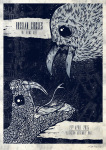



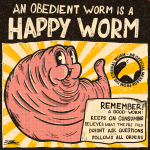










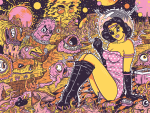
April 21, 2020
(Art) The Dark Fantasy Portraits of Jim Pavelec
[image error]
You find yourself strolling the hall of a dark house. You are most concerned with how to get out, and so, although your head is turning forward and back, you don’t at first notice the figures in the portraits on the walls. From what you glance out of the corner of your eye in the dim light, mind bent on escape, they seem much they same as any portraits one might find in a house such as that.
You look up and see they are not.
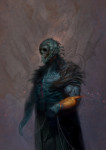
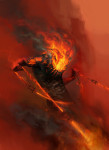

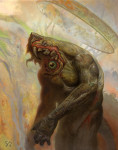
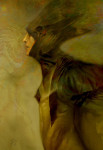
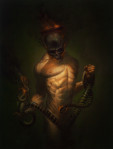

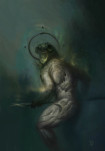
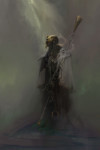
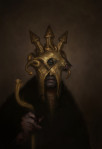
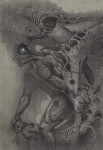
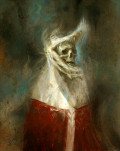
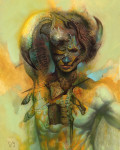


Find more by the artist on his ArtStation page.
April 20, 2020
(Fiction) Do You Like Hurting People?
[image error]
The charges included assault and battery (of 22-year-old Guillermo Aquino with a hypodermic needle); arson (of the rental house at 421 Asher St.); fraud (profiting under pretenses, namely, that Nio was a false expert); practicing medicine without a license; burglary (of the $800 Canine Companion, which the District Attorney claimed she stole for the purposes of committing arson); aiding and abetting (the operation of an illegal mod parlor); refusing to assist a police officer (by remaining as silent as a monk while a house burned); and fleeing a scene. Because of the number and severity of the charges, and because she had arrived on an out-of-state bus and either couldn’t or wouldn’t give a permanent address, she was held without bail. Because of her contact with the unknown organism, she was kept by herself in a holding cell, where she was arraigned, in lieu of potentially infecting everyone at the jail or courthouse. It was unnecessary, born of irrational fear, but Nio didn’t mind. It meant everyone came to her. It was then that all those involved in the case finally heard her speak for the first time:
“Not guilty.”
The judge explained that in the State of South Dakota, having a prior felony conviction meant that all of the charges against her were automatically raised in severity—a Class C felony became a Class B, a Class B became Class A, and so on. Since her prior had been a violent felony, sentencing would be pushed to the maximum.
“You are facing up to 80 years in prison,” the woman said. “This is very serious. Do you understand that?” She asked it cautiously, like she wasn’t she if she needed to call in a psychiatric expert or try another language.
“Yes.” Nio ran a hand over her scalp.
She had cultivated that misunderstanding at first—that she might be a simpleton. Or rather, she simply didn’t contradict it when she was found standing shoeless in the snow, shaved head and all. Nio had expected help to arrive. Not talking was the best option until it got there. But help was looking increasingly unlikely, which left her in a quandary.
“Fine,” the judge said, gathering her papers. “You’ve been appointed a lawyer. I urge you to listen to him.”
The baggy, bespectacled man next to her stiffened slightly in pride.
“Is there some reason why I can’t have my medicine?” Nio asked. “I get headaches.”
The judge turned to the sheriff, who told her calmly but apologetically that he’d see to it. By his reaction, it seemed to be news to him. It wasn’t until the next day that he complied, and Nio spent the night in agony.
That morning, the door to the booking room buzzed and the sheriff stepped into the long walkway that ran in front of the barred cells. He shut the heavy door behind him, making sure it was locked, and tossed an unopened box of aspirin. Nio was sitting cross-legged on the floor of her cell, meditating, and caught it one-handed. She looked at the red box quizzically.
“All I could get on short notice,” he said, leaning against the wall. “Your pills tested positive for opiates.”
“Are you amending my charge sheet?”
“That’s up to the district attorney.”
His nameplate said Marbrant. He had a thick gray mustache and two lifetime’s worth of wrinkles. He looked down the hall toward the fire exit.
“I used to think nothing much ever happened in this town,” he said. His voice echoed slightly off the painted block walls. “I liked that.”
Nio sat with socked feet under the beam of sunlight that fell in an angled shaft from the long window near the ceiling. The light bounced off the floor before scattering off the pale walls, illuminating everything brightly, like a photographer’s studio. She couldn’t get a good read on the sheriff’s bioelectrics. The bars interfered.
“First the deep core miner came. We were promised jobs. All we got was earthquakes. Then, couple years ago, some of those dinosaurs moved through. You know about them, right? Smaller than I thought. I mean, don’t get me wrong. Some were bigger than a bull moose. But I thought dinosaurs’d be able to trample houses or something. Still, beautiful in their own way, with those colorful markings and everything. They passed a couple miles east of here on their way up to Canada. The whole town went out to see. Damndest thing.” He paused. “And now there’s you.”
Sheriff Marbrant took another long slow breath and rested his hand on his belt. “Unfortunately, it doesn’t look like anything significant will be recovered from the wreckage. It was an old house and took to that fire like a stripper to a pole, as my cousin likes to say. Still, the FBI’s supposed to be sending a man from Minneapolis in the morning, so you never know. Maybe they’ll dig something up.”
“Maybe.”
“You’re gonna have to watch out for Dr. Aquino, though. Guillermo’s mom. She’s real protective of that boy. And she knows Judge Bennam.”
“So I gathered.”
Nio had seen them talking at her arraignment.
“She seems to think you’re some kind of criminal mastermind who tried to murder her son and then blame everything on him. Kinda hard to argue with her when you won’t tell us how you came to be there.” He watched her swallow several pills. “You want more water?” He nodded to the bottle in the corner.
“I’m fine. What about the girl? Is she okay?”
“Beckham Carter?” He sighed. “Well, she’s got permanent tissue damage. And apparently she’s in a lot of pain. Whatever it was fried her nerve endings. Docs said there was no reason for that.”
“He just wanted her to suffer,” Nio whispered.
“Who?”
She shook her head.
Sheriff Marbrant raised his eyebrows. “Well, she’s gonna recover. Be on meds her whole life, though. She’ll never mod herself again, that’s for sure. Or so she tells me. Sister’s still a real piece of work.”
“Still sticking up for the boyfriend?”
The sheriff nodded. “Dr. Aquino brought her in a couple days ago to ‘amend’ her statement.”
“Let me guess. She’s corroborating the version of events crafted by their attorney.”
“Something like that. But . . . Dell Torrey is sticking to his guns. That’s not easy in this town. He is absolutely adamant that you’re a hero, that you saved Beckham and everyone else in that house—and to hear him tell it, maybe even the whole human race from another zombie plague.”
“They’ll get to him before the trial. If not the doctor or the lawyer then the gangsters.”
“Yeah, he mentioned something about that. I wouldn’t count him out, though. Dell’s something of a local hero himself.”
“Military?”
“Football.”
“Ah.” Nio smiled.
“God, country, and high school football,” the sheriff explained. “In that order.”
“Where I grew up, there was something similar. Only it was basketball.”
“You from Carolina?”
“Taipei.”
“You don’t look Chinese.”
“Neither do you.”
Sheriff Marbrant exhaled in a half laugh, half snort. When his smile faded, he straightened his steel buckle absentmindedly and picked at something stuck to the top with his thumb.
“Something you wanna ask me, Sheriff?”
“I don’t suppose you know a woman named Maureen Arneson.” His eyes went to Nio as soon as he pronounced the name.
“Should I?”
He shook his head. “Probably nothing.” He looked down again. “You know, if you gave a statement that materially matched Dell’s, it would sure help convince the prosecutor.”
“Correct me if I’m wrong, Sheriff, but such a statement would amount to the admission of several crimes, would it not?”
“There’s always that.” He smiled weakly. “Officer Grady seems to think you’re waiting for something. Help, maybe. That true?”
Nio paused. “I was. But it looks like that’s not coming.”
He nodded at her statements as if they were a sermon. “I wonder if you could answer me something,” he said finally.
“If I can.”
“What do these people want?”
Nio squinted. “What do you mean?”
“Let’s say Dell is right. What was the point of doing that to that poor girl?”
“Why ask me? If Dell’s right, I tried to help.”
He glanced at her head, at the scars. “I guess I just assumed you knew about that stuff.”
“That stuff,” she repeated. “It’s interesting, don’t you think, that we still haven’t given it a name.”
“What do you mean?”
“Well, if we give it a name, then it exists, and if it exists, it’s a problem.”
“I’m afraid I don’t follow.”
Nio traced the cracks in the high ceiling with her eyes as if reading a story they told. She opened her mouth but didn’t speak right away. It took her a moment.
“In 1994, 17-year-old David Hahn, a Boy Scout and future Marine, raided junk yards in his native Michigan for trace amounts of radioactive material: americium from smoke detectors, thorium from camping lanterns, radium from clocks, tritium from gunsights, and so on. In a shed in the back of his house, he used a Bunsen burner and lithium he’d collected from a thousand dollars worth of batteries to purify thorium ash, which he added to a bored-out block of lead with the hope of eventually making a breeder reactor.
The sheriff scowled.
“It’s a reactor that produces more fissile material than it uses, meaning it can be used to seed other reactors. Imagine if that went wide. He didn’t succeed before the FBI found him, but he did make a neutron source, which is the first step.”
“Jesus.”
“We love it when the guy tinkering in his garage is Bill Gates or Carroll Shelby . . .” She turned her head. “Five years later, inspired by the event, a pair of University of Chicago graduate students produced a working ‘reactor in a shed,’ which was one of the items on the university’s annual scavenger hunt. They were later able to isolate trace amounts of plutonium.
“Less than a decade after that, in 2008, at his home in Arkansas, 14-year-old Taylor Wilson built a fusor, a device that suspends a magnetic field between two cages to heat ions to fusion conditions.
“Pick any science and it’s the same story. In 2016, geneticist and biohacker Josiah Zayner began producing and selling CRISPR-based home genetic modification kits over the internet. The idea was that since rich people would undoubtedly use it to make their kids smarter and prettier, everyone else should have access, too. That’s how modding started—guys wanting to grow an eight-foot penis and shit like that.”
“Now they’re using it to get away with murder.”
“And the number of these incidents is increasing geometrically.”
“Okay . . . but why?”
Nio stretched her legs and laid them straight. “I remember sitting in organic chemistry class as a kid and my instructor was droning on about anhydrous nitration. He wrote all these chemical formulas on the board. I couldn’t’ve cared less. I don’t think I wrote a single thing down. Then, as he’s erasing it all, he lets it drop that what he’d been describing that whole time was the process for making tri-nitro-toluene.”
“TNT?”
“I remember the lecture hall filling with shuffling noises as everyone suddenly sat up and took note.”
Sheriff Marbrant chuckled. “That’s a good teacher.”
“You better believe we all paid attention after that—‘til the end of class anyway. Not that a bunch of 13-year-olds ever made TNT, but when you’re that age, learning something dangerous is just more interesting. More fun. Not everyone who plays around with this stuff has a mental illness. For some guys, there’s definitely a ‘hold my beer’ element to it. We like to stereotype them as morons, but a lot of them are actually highly intelligent. Hard-working, too. I’m sure you’ve seen the videos online. Some of those stunts take a lot of planning and craftsmanship.”
“They could take those skills and get a job,” the sheriff suggested.
Nio smiled. “Spoken like a lawman.”
“Doesn’t mean it’s not true.”
She got up and sat on the bench affixed to the rear wall. She ran a hand over her scalp. “Tell me something, Sheriff. Those jobs the mining company promised. How many of them were blue collar?”
He didn’t answer. He didn’t have to.
“Rig like that, most everything will be automated, so you’re talking a skeleton crew of mostly skilled engineers. Can’t get a job like that without a degree. Doesn’t matter how smart you are. If your resume doesn’t check the right boxes, no corporation’s gonna take the risk. Why would they when there’s twenty other safe and compliant applicants? So you go to school and learn the approved curriculum, which takes years and gets you tens of thousands of dollars in debt to a bank that doesn’t care one snit about you. Now you’re in—and you spend the next 40 years of your life working to make someone else rich, just so you can pay back the money they lent you in the first place. Any job that pays decent is gonna be somewhere expensive to live, so you’re either pissing away the rest in rent, or you’re spending half your life in the car. Society makes that the choice and then wonders why these guys don’t wanna play.”
“What about the Hahn kid? You said he was a Marine.”
“If I remember correctly, he enlisted after his mother committed suicide. Something like that. Navy, I think. Without any credentials, what do you think they had him doing? You think a kid who built a nuclear reactor out of junk at 17 was appropriately challenged by swabbing the deck? I don’t remember what he did for the Marines, but I remember they discharged him on mental health grounds. ‘Good luck, kid.’” She waved. “That was his reward for playing by the rules. So of course he stopped playing. He was arrested—trying to steal smoke detectors. Something like that. I remember his mugshot showed that he was covered in radioactive sores. He died in his 30s from an untreated addiction.
“There’s a million of these stories. It’s an unnamed epidemic. Near where I grew up, there’s a memorial. Some years back, a 50-year-old mechanic with no history of violence packed a pipe with explosives and boarded a commuter train heading north from Nantou, where I was born. At Banqiao, New Taipei City, he switched to a local and waited several stops for people to board. As the train entered a busy Songshan Station, he detonated.
“Rather amazingly, he survived. In the aftermath, it came out that he had been let go from his company, that he had suffered a recent bout with cancer, that he was estranged from his family. When the police asked him why he did it, though, he said he didn’t want to kill anybody. He had only intended to commit suicide. He knew no one would help him, so for one brief, glorious moment, he wanted to stop the city in its tracks. He wanted everyone to see.
“Imagine if he had had access to something other than a pipe bomb. Imagine if some angry kid in LA, instead of shooting up his school, decided to wipe out all of Orange County with a momentary singularity.”
The sheriff was quiet a moment. “Can’t say I’d mind all that much.”
Nio smiled.
The sheriff grimaced and shifted his stance. “Okay, but making a reactor is one thing. Hacking a young girl’s body like that . . . I hear they can steal people’s memories now. I can at least lock my damned car.”
“You can thank the police for that one. They asked a university cognitive sciences lab to quickly wire the brain of a woman who had been bludgeoned into a coma and died at the hospital. The media blew it up, but they only retrieved some very basic information: whether her eyes registered light or dark when she was beaten, whether she was wet or dry, that kind of thing. It had rained that night and they were trying to impeach the defendant’s story that when he left her, she was safe at home. I predict there’ll be a lot of headless corpses in the future, Sheriff. And since you mentioned it, yeah—memory theft. Courts will subpoena thoughts. Media companies will sue regular folks for having infringing fantasies involving copyrighted synthetic personalities. It’s all coming.”
The holding cells fell quiet. The sheriff reached to his back pocket and pulled out a folded letter. The envelope had been opened. He held it up. “This was in your personal possessions.”
He pulled the top open with his thumbs and looked into it like he expected to find something new. “We opened it hoping to get a name or address.” He looked up. “You haven’t read it yet, have you?”
Nio shook her head.
“Do you want to?”
She didn’t answer, and after a few moments, the sheriff knocked on the door. It buzzed from the outside and he pulled it open.
“I’ll put it with the rest of your things.”
The door shut behind him with a click.
The following day, Nio was told she had a guest. She was led from her cell by the same woman who had arrested her the week before. They didn’t speak. Nio expected to be taken to one of the interview rooms, as she had been each time previously, to meet with the DA or her court-appointed attorney. Part of her hoped Mutiny had come to South Dakota—without calling—and Nio was rehearsing what she would say. But she wasn’t taken to the interview room. She was stopped in the office and her handcuffs were removed and she was left alone in the middle of the floor. She watched the officer step out the door and shut it behind her.
She looked around. “Is this a lynching?” she asked no one.
Tires crunched gravel. Nio turned to see a limousine roll to a stop outside. A rear door opened and a middle-aged male chimpanzee in a finely tailored suit and no shoes slid out of the back seat to the pavement. He wore cuff links, a paisley tie, and custom black-rimmed bifocals. He walked to the door on his knuckles but stood upright to open it. Nio guessed he was at most four feet tall. Once inside, he waited by a desk as his human bodyguards came in behind him and quickly checked the office. Satisfied, they stepped out, and Nio was alone with an ape.
“I’m told I look taller on TV,” he said. He held out his hand. “Dr. Hamilton Chang.”
Nio took it. “Ah, yeah. I kinda figured.”
His nails were trimmed and his grip polite. Nevertheless, there was something decidedly bestial in the grasp—the dark coarseness of his skin perhaps. And his biolelectric field was strange, completely unlike anything she’d felt before.
Both Nio and Dr. Chang noticed each other’s feet. She was in her striped socks. His feet were bare. They flexed their toes in show.
“After careful study,” Dr. Chang explained, “I’ve found that any shoes large enough to fit me also make me look like a clown—more than usual anyway—and that it’s more comfortable for everyone involved if I dispense with that particular human convention and walk as nature shod me. Please.” He motioned to a chair like the police station were his personal office. Then he climbed up one himself, gripping it with his feet like a baby climbing up a sofa.
Rather than sitting against the back, which would’ve forced his bare soles to face Nio, Dr. Chang settled on the edge and crossed his legs, picking a piece of lint from his cuff like a tick from fur.
“I console myself with the observation that, while human feet are certainly daintier and more attractive, they are only made for walking, whereas I have four hands. Alas, in compensation, Nature omitted an opposable thumb from every single one of them.”
“On TV, they always film you from the waist up,” Nio observed.
“Quite. It’s a perk of my position.” His glasses slipped and he pushed them back up his face. “You must be wondering why I am here.”
“Did Mutiny send you? Because if you’re here to lecture—”
“Not at all. I haven’t seen Ms. Ali in some time, but I enjoy following her exploits, as I do all of you. I am not here to lecture. I will admit a certain paternal compulsion, but I was only an adviser on the project. I am at best an uncle. But speaking of the others, I wonder: when was the last time you saw Sol?”
“Sol?” Nio scowled. “Ummm . . . That woulda been Luke’s coming out party. Five years ago. Why? Is there news?”
“No, sadly. The FBI have done their best, but I’m afraid they’re not staffed for this kind of thing.”
“FBI? I thought he had a brain hemorrhage.”
“Indeed.”
Nio waited. “So . . . something was suspicious?”
“Absolutely nothing, which is why I asked them to take a look.”
“I thought you were the head of the National Science Foundation.”
“Alas, my term at NSF ended last year. I am now ‘special acting science adviser to the president’ or something like that. To be honest, I’m not sure. I’m still waiting on the business cards.”
“Sounds important.”
Dr. Chang reached into the breast pocket of his coat and removed a folded slip of paper. He opened it and tossed it on the desk between them. “How long have you been chasing him?”
Nio didn’t move. She didn’t need to. She could see it was a page from a sequence report, probably from the tissue removed from Beckham Carter.
“Him?”
“The man who hurt that young girl. Not the young psychopath you sent to the hospital. The man who told him what to do. The one at the other end of the computer. There have been others, I suppose?” Dr. Chang asked.
“Six,” she said softly. “That I know of. He never acts directly so it’s hard to say.”
“Yes, he appears to be recruiting.”
Dr. Chang nodded to the paper. Above the rows of G’s, C’s, A’s, and U’s, he had sketched an ancient Hebrew numerological wheel. Base sequences were circled and labeled with Hebrew letters, converted via the wheel into Pythagorean ratios, which were then matched to a letter of the Latin alphabet. There were gaps between, but the circled sections spelled a question:
D O Y O UL I K E H U R TI N G PE O P L E?
“He’s been using occult cyphers,” Nio said. “Hermetic alchemy, Hebrew gematria.”
“If you hadn’t burned the house down,” Dr. Chang suggested grimly, “the police might’ve been able to recover computer evidence that the young man deciphered the messages, which would prove he knew what he was doing. As it stands, his attorneys will no doubt claim he was a victim and try to pin any offenses on you.”
Nio rubbed her face. “Yeah, well, I had to improvise.”
“Targeting those involved in illicit activity is clever. His victims will be very unlikely to go to the authorities.”
“Which is why no one’s looking for him. He’s used a few different names, but lately he’s been going by ‘Mr. Misery.’ I’ve done what I could, reverse image searches and semantic text matching, but so far nothing.”
“So you went into the field.”
Dr. Chang slid from his chair and walked with swinging arms to chalkboard that summarized all of the sheriff departments open major cases. He stood before it and crossed his arms behind his back. If the media was correct, Dr. Hamilton Chang, known as “Chop-Chop Chang” before the space flight that changed him forever, was one of the smartest creatures in the world. Nio wondered what he was thinking.
“What draws you to him?” he asked without turning from the board.
“I’ve been asking myself that same question.”
“There must be a reason. Someone of your intelligence doesn’t take this kind of risk on a whim.”
“Let’s say it’s personal.”
“Well, you won’t find him from inside a jail cell.”
“Dr. Chang, sir, you came a very long way.” She paused. “Did something happen to Sol?”
The chimp turned finally. “Sol didn’t just have a hemorrhage. He had the mother of all hemorrhages. The autopsy found several infarcts clustered around his pineal gland. Seven, in fact.”
“Seven?”
“They ranged in size. And yet, all the clotting was post-mortem.”
Nio thought for a moment. “An accident? He banged his head and it only caught up to him later?”
“Very good. That’s what the medical examiner suggested—while at the same time noting in her report the complete absence of bruising, either on his skin or the surface of his brain, which you would expect if his head had been rattled so badly that he tore his cranial blood vessels in seven places. In fact, there were no marks on his body of any kind. No signs of trauma. No puncture wounds. His blood and tissues were free of all known toxins. There were no drugs in his system and only a trace amount of alcohol. He didn’t even finish the champagne he was given. And in the hours leading up to his death, he was surrounded by others who reported him to be in good spirits. He was met at the train station by several academics at Columbia, where he participated in an afternoon symposium before joining them for dinner. He was giving a public lecture that evening before a hundred people when he began speaking gibberish and collapsed. He was dead before the ambulance arrived. Several of the guests recorded the talk on their devices.”
“So there’s footage.”
“From multiple angles,” Dr. Chang said.
“And?”
“Nothing indicates anything untoward.”
Nio was squinting. “Except for the fact that his brain burst from the inside out.”
Dr. Chang inhaled a long, slow breath. “This morning, at my request, the FBI filed a writ with the Fifth Judicial District of South Dakota requesting that you be remanded into their custody. The court is not obliged to grant the request, but I see no reason why they wouldn’t, if only to make you the federal government’s problem. You’ll still be facing charges, of course, some of them quite serious, but I suspect that with the full weight of the Justice Department on your side, you’ll be able to negotiate a generous plea—perhaps even avoid further jail time. But I cannot guarantee that, of course. If you accept, you’ll have a mountain of paperwork to complete, and you’ll be fitted with an ankle bracelet. Your movements will be both limited and monitored constantly by the Bureau. But you’ll be out of that cage and helping to right a very serious wrong.”
“Wrong?”
Dr. Chang walked to her on his knuckles. “I will be frank. I suspect we’d both prefer it.” He stood straight in front of her. “I believe your brother was murdered.”
“Murdered? Who would want to kill Sol?”
“Before he disappeared, he was working on something, something so revolutionary, he kept it to himself. None of his colleagues had any idea what it was.”
“That doesn’t sound like the Sol I knew. He was one of the most open people I’ve ever known.” Nio paused. “He got his heart broken a lot.”
“And there lies the answer to your question.”
“Ah.” Nio walked to the window. Outside, Dr. Chang’s suited bodyguards were keeping a close vigil on the front door. Secret Service. There was a tear clinging desperately to the lashes at the corner of her eye, and she wiped it. “You think he told one of the others what he was working on.”
“Wouldn’t you, if you were him?”
Mutiny had been Nio’s first call, however indirectly.
“I’m not exactly everyone’s favorite, you know. Not after—” She stopped.
“But if any of them are carrying his secret, they will be far more likely to share it with family. The FBI has made it clear they’re not interested in pursuing the matter further.”
“So you’re providing a free resource.”
“They’re humoring me because I am a very public figure and because I have the ear of the president. But their patience is not infinite. You would have to work quickly if you hope to benefit from their aid. Talk to the others. Find out what they knew. That’s all I ask.”
Nio sat on the sill near the radiator. “Okay. But there’s still the obvious question.”
“Of course.” Dr. Chang nodded. “What’s in it for me?”
“And?”
“It’s a fair question, albeit one I’m not inclined to answer at the present time.” Dr. Chang held out his course-skinned hand. “Do we have a deal?”
April 19, 2020
(Art) The Ultra-real Sci-fantasy of Yintion Jiang
[image error]
While many of the fantastical works of Chinese artist Yintion Jiang are classically rendered, some look like photographs of technology that doesn’t exist yet. Fascinating!
Find more by the artist on his ArtStation page.

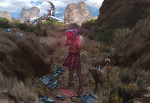
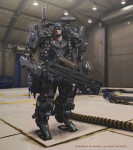
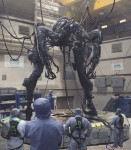


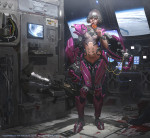
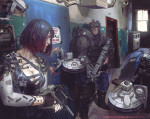
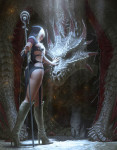
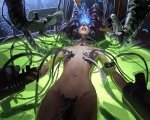


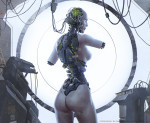
April 16, 2020
On Misanthropy
[image error]
My buddy the engineer clings to the nobility of man, presumably because we invented mathematics. He accuses me of misanthropy.
But I am not a misanthrope. A misanthrope hates mankind, which I do not. Neither do I hate bobbit worms, tornadoes, or cellular slime molds.
I see mankind no differently than I see the chimpanzees with which we share almost all of our DNA. Or perhaps alligators might be a less inflammatory example.
When an alligator takes a child, or a mountain lion the family pet, it is a tragedy. We might, for reasons of safety, put the animal down. But we have no expectation that they could’ve acted differently. To hate them, one may as well hate the weather, or bad teeth, or the river in your way.
Across the entire length of recorded history, only a handful of our kind are worthy of being called something more than ape. I suspect they would all fit comfortably on a single cruise ship — with room to spare.
The rest of us are no different than any other large social mammal. Our behaviors are near-completely explicable on just two variables: food and reproductive success. I’m not convinced the remainder isn’t due entirely to chance.
We are wild animals — irrational and unpredictable. We’ve simply radically expanded the boundary of the herd inside of which the same social rules govern now as always.
Even restricting ourselves to the last century, on any objective measure, we are no more domesticated than a herd of wildebeest. In fact, I suspect we killed far more of each other in the 20th century than they did. And on the numbers, we rutted no less.
Orine and I watched the Netflix documentary “Don’t F**K With Cats” recently. It’s a wonderful and subtly complete catalog of human behavior. I suspect most people who watch it won’t see past the titular horrors. But then, it’s a bit like trying to explain water to a fish.
There is no participant in that entire mess who did not behave atrociously — the police, the media, the “regular people” on the internet, the audience, even the filmmakers, who at least acknowledged their participation in the tragedy, however impotently, at the end.
I don’t hate humans, not any more than I hate fish. Both are a natural function of this planet. I’m not optimistic about our long-term chances, but then, I’m not pessimistic either. I suspect we will suffer the same fate as 99.99% of all species that ever lived: namely, go extinct — but probably not anytime soon.
However, before we do, we will likely create the first conscious, intelligent beings in history who are not animals and who therefore have a chance at becoming what we like to pretend we are.
The future belongs to them.
For those who want an appreciation of just how “bad” it really is, take this Stanford course on Human Behavioral Biology:
cover image: Human Development by Eleanor Litz
April 14, 2020
(Art) The ‘Midnight Paintings’ of Dr. Seuss
[image error]
Over a lifetime of sleepless nights, Theodor Seuss Geisel, aka children’s author Dr Seuss, created hundreds of artworks he called his ‘Midnight Paintings’. Although famous for his rhyming picture books, Geisel created topical and surrealist art, much of which was kept private until his death.





